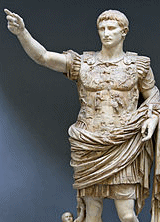
period of the ancient Roman civilization
, characterised by an autocratic
form of government and large territorial holdings in Europe and around the Mediterranean.
The 500-year-old Roman Republic
, which preceded it, had been weakened and subverted
through several civil wars
. Several events are commonly proposed to mark the transition from Republic to Empire, including Julius Caesar
's appointment as perpetual dictator
(44 BC), the Battle of Actium
( 31 BC), and the Roman Senate's granting to Octavian the honorific
Augustus
( 27 BC).
Roman expansion began in the days of the Republic, but the Empire reached its greatest extent under Emperor Trajan
: during his reign (98 to 117 AD) the Roman Empire controlled approximately km2 of land surface.
215 BC A temple is built on the Capitoline Hill dedicated to Venus Erycina to commemorate the Roman defeat at Lake Trasimene.
44 BC Julius Caesar, Dictator of the Roman Republic, is stabbed to death by Marcus Junius Brutus, Gaius Cassius Longinus, Decimus Junius Brutus and several other Roman senators on the Ides of March.
43 BC Octavian, later known as Augustus, compels the Roman Senate to elect him Consul.
27 BC The title Augustus is bestowed upon Gaius Julius Caesar Octavian by the Roman Senate.
8 Roman Empire general Tiberius defeats Dalmatians on the river Bathinus.
37 Caligula becomes Roman Emperor after the death of his great uncle, Tiberius.
37 The Roman Senate annuls Tiberius's will and proclaims Caligula emperor.
37 Roman Emperor Caligula accepts the titles of the Principate, entitled to him by the Senate.
41 After a night of negotiation, Claudius is accepted as Roman Emperor by the Senate.
51 Nero, later to become Roman Emperor, is given the title ''princeps iuventutis'' (head of the youth).
53 Roman Emperor Nero marries Claudia Octavia
55 Tiberius Claudius Caesar Britannicus, heir to the Roman Emperorship, dies under mysterious circumstances in Rome. This clears the way for Nero to become Emperor.
68 The Roman Senate proclaims Galba as emperor.
68 Roman Emperor Nero commits suicide, after quoting Homer's ''Iliad''.

